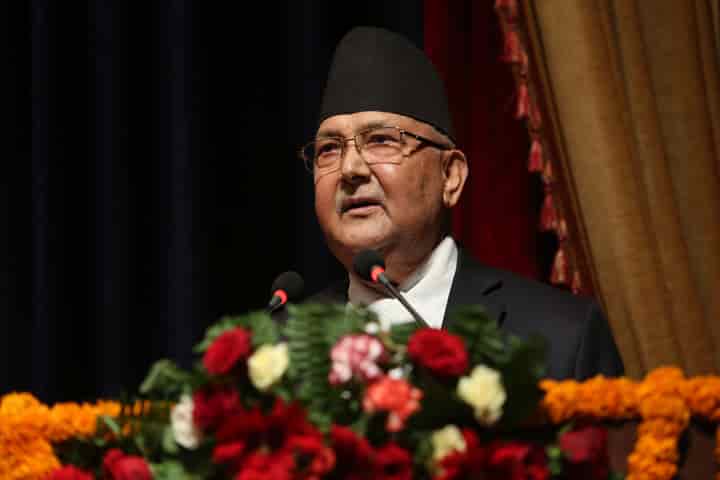China influenced Nepal through Prime Minister K.P. Sharma Oli, his ministers, and senior advisors. A recent report by the Global Watch Analysis has shown how Beijing bribed these people, so that they could help it in its expansionist designs.
The report has highlighted the machinations of the Chinese Communist Party, whose government helped Oli build personal fortune, thus giving credence to the adage that poor nations have rich politicians. The report said that $5.5 million have been put in an overseas account in form of long-term deposits and shares. It further added that the account gives a total yield of half a million dollars to Oli and his wife Radhika Sakya on an annual basis.
Ronald Jacquard, the author of the report, writes that “the modus operandi often adopted by China to make inroads into economically weaker nations, whether in Asia, Africa or Latin America, has been to strike deals with corrupt Heads of States. This enables Chinese companies to not only further their business interests in that country but the Chinese State to surreptitiously penetrate the nation’s polity, with the objective to ensure its long-term influence.
The Himalayan nation of Nepal is emerging as a classic example of this Chinese machination where the ruling Nepal Communist Party, led by Prime Minister K.P. Sharma Oli has been seen to blatantly advance Chinese interests, to the extent that it has made many senior members of his party uncomfortable.” The report is exhaustive and cites examples of corruption charges against the Nepalese Communist leader dating back of his first tenure as Prime Minister in 2015-16.
“With the assistance of the then Chinese Ambassador to Nepal Wu Chuntai, he had initiated the process to invest in the telecommunication sector in Cambodia.” Exposing the details of the shoddy deal, the report claimed that the deal was finalized by the now-deceased Nepalese businessman Ang Shering Sherpa, a close confidante of Oli’s, and with the intervention of Cambodian Prime Minister Hun Sen and felicitation by a top Chinese diplomat in Phnom Penh Bo Jiangeo.
In his second term as Prime Minister since 2018, Oli’s tendency to circumvent government regulations to award projects to Chinese companies has caught public attention. Investigations in many of these cases have pointed at kickbacks leading to Prime Minister Oli or his close coterie. For instance, in December 2018, China Communication Service, an agent of Chinese telecom major Huawei, received a contract for setting up a ‘Digital Action Room’ with video conferencing facilities in the Nepalese Prime Minister’s office. It was awarded to the Chinese company without a competitive bid, even though the government-owned Nepal Telecommunication had the expertise to create the facility.
Later investigations indicated that Prime Minister’s Political Adviser Bishnu Rimal’s son had pushed for this deal in return of financial gains. Chinese telecom giant, Huawei faces a huge backlash of being infested with security hazards globally. It has been banned by many countries in the US, UK, Australia, and New Zealand. In Nepal, however, China might have been given a free pass. It is an open secret that China uses telecom infrastructure in other countries to spy for State secrets.
In 2018, it was revealed that China had ‘gifted’ the African Union a headquarters building. The building was allegedly bugged. Coming back to Nepalese-Chinese dubious deals, the report disclosed, in May 2019, Nepal Telecommunication signed an agreement with same China communication Service Company for developing radio access network with China’s telecom equipment manufacturer ZTE for installing the core 4G network worth 19 million Nepalese currency.
PM Oli also overturned the decision of his predecessor Sher Bahadur Deuba to not award the $2.42 billion contract for 1,200-MW Budhigandak Hydropower project, the largest in the country, to the Chinese State-owned China Gezhouba Group Company. It is known in Nepal that the decision prompted after a Nepali businessman close to the Prime Minister received a large kickback from China. Two investigations are also underway into the accusations of Nepal’s Health Minister and several others in Oli’s inner coterie taking bribes in the purchase of medical equipment from China.
The volatile GWA report has come at a crucial time for Oli. He is already facing internal party rebellion and constituents’ leaders Prachanda and Madhav Nepal upping the ante to oust him from power. China is working overtime to save his pliable dispensation in a bid have greater control over Himalayan State. And what, pray, is Oli doing? Samuel Johnson famously said, “Patriotism is the last refuge of a scoundrel.”
In the case of Oli, it surely is. He has recently emerged as a hyper-nationalist, abusing India in the most preposterous terms, making weird territorial claims and even weirder statements, as the one on Ayodhya.




















